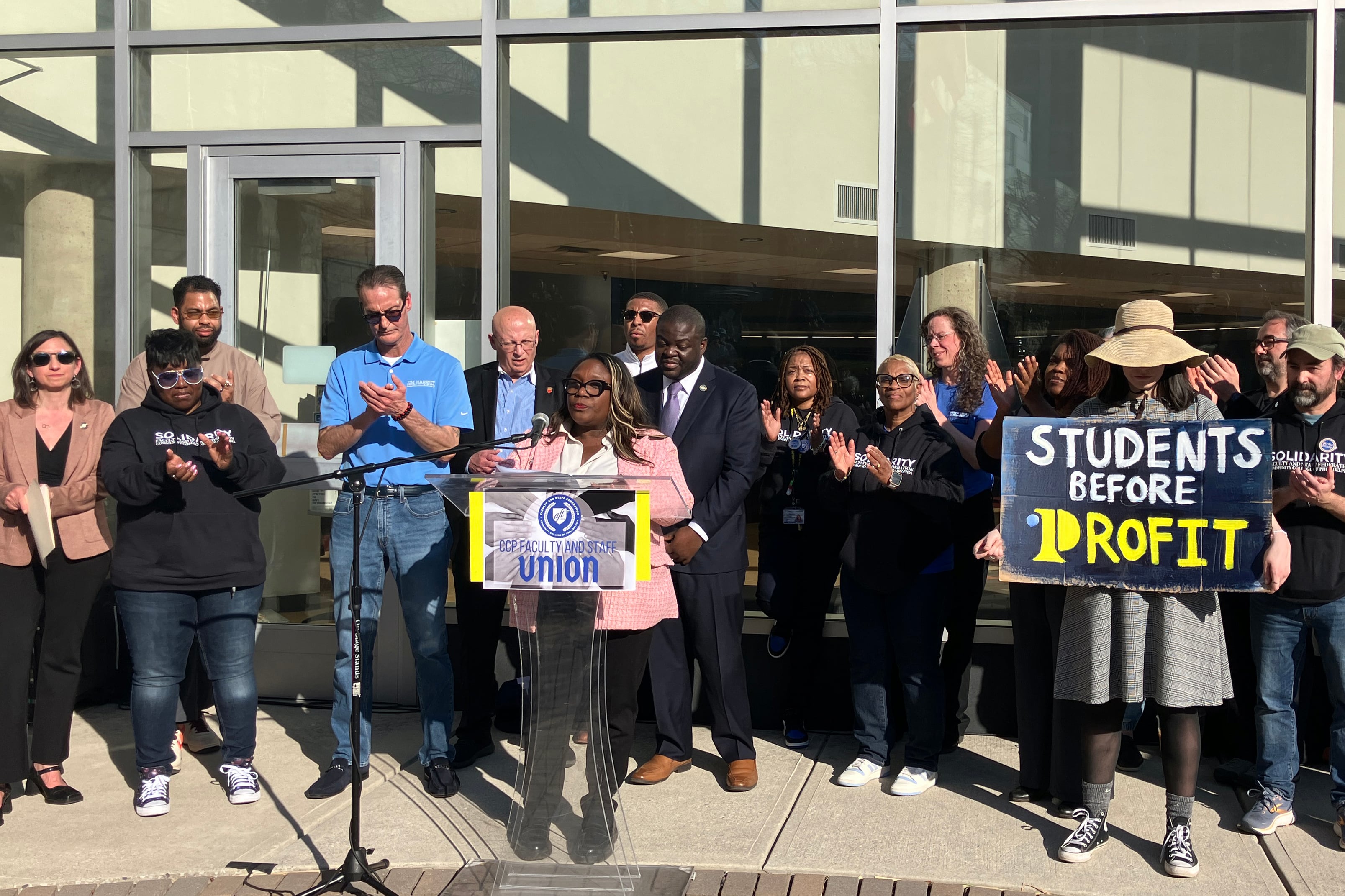Sign up for Chalkbeat Philadelphia’s free newsletter to keep up with news on the city’s public school system.
Nearly 1,000 high school students at the Community College of Philadelphia’s dual enrollment programs could be affected by a potential strike at the city’s largest institution of public higher education.
Over the weekend, 97% of the community college’s staff and faculty union members voted to authorize a strike, should their union and the college’s administration fail to reach a contract agreement. The union is demanding pay raises that keep pace with inflation and class size reductions, the return of a child care center on campus, and subsidized transit passes for staff and students.
The vote means union members agreed to allow their leadership to call a strike at any time, but the faculty are not on strike.
In a statement Monday, representatives from the American Federation of Teachers Local 2026 union, which represents 1,200 full- and part-time faculty and other staff members, said a strike would be a “last resort if continued negotiations fail to produce meaningful progress” towards their proposals.
“Our members are the front lines of the college, in the offices, in the classrooms, on the ground and everywhere in between. We are tired of waiting and we are strike ready,” union Co-President Rainah Chambliss said in a statement.
There are 973 students currently participating in dual enrollment programs at the Community College of Philadelphia, and this school year, there have been a total of 1,366 students who’ve been enrolled in these programs. In addition, there are an estimated 600 students who study in dual enrollment programs over the summer.
The number of new dual enrollment students at CCP has increased 23% from last year, according to a report from the community college’s president.
The Philadelphia school district also partners with the college on a “Gateway to College” program. This serves students ages 16 to 21 who dropped out of high school and lets them earn their high school diploma and college credits simultaneously.
In the event of a strike, dual enrollment classes could be canceled and students and their family members would be notified via email and text, said Shannon Rooney, a vice president at the Community College of Philadelphia, in a statement. These high school students “may need to make up classes that are missed” if there’s a strike, Rooney said.
“As with all students at the College, dual enrollment students would be encouraged to remain engaged with their coursework by way of their course syllabi and any course materials, advance readings, and assignments,” Rooney said.
If the faculty go on strike, Philadelphia district students would remain at their high school, and complete their senior year projects and any other graduation requirements under the supervision of a counselor or teacher while they participate in “college and career readiness” lessons online, district spokesperson Monique Braxton said.
The union and the community college leadership have been bargaining since January 2024, and faculty have been working without a contract since their previous one expired in August 2024.
With graduation looming, the college said this month the administration filed a request for the appointment of a fact-finding panel with the Pennsylvania Labor Relations Board.
The college said in a statement that it’s confident its proposals “provide fair terms and wage increases for all.” But union members, joined by several elected officials last week at the launch of the strike authorization vote, say there is money in the college’s budget to raise salaries, add more counselors and student advisers, and reopen a childcare center shuttered during the pandemic, among other proposals.
The union’s position has notable political support. Mayor Cherelle Parker’s proposed budget includes $15 million over five years for the college to “support its workforce,” on top of other funding for the school. Last October 2024, the City Council unanimously passed a resolution in support of the union’s demands, and several of its members joined union members on campus last week in a show of solidarity.
Among them was City Councilmember Kendra Brooks who studied at CCP as a single mother. Brooks’ daughter is now a dual enrollment student at Franklin Learning Center.
Dual enrollment is “an amazing opportunity,” Brooks said. “We have to rectify the strike situation so we don’t interrupt learning for our students. … We’re talking about how we can build the next generation of professionals in the city and CCP is an amazing start. So why not get them started early?”
This story has been updated with additional information about plans for district students in the event of a strike.
Carly Sitrin is the bureau chief for Chalkbeat Philadelphia. Contact Carly at csitrin@chalkbeat.org






